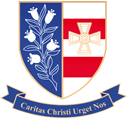
Our Curriculum Intent:
“When I look back, I am so impressed again with the life-giving power of literature. If I were a young person today, trying to gain a sense of myself in the world, I would do that again by reading, just as I did when I was young.” – Maya Angelou
The English department aims to provide all students with opportunities to explore a broad range of literary genres, periods and writers in order to develop an understanding of the power of language and literature. They should also become confident and articulate writers who understand how to harness the power of the written word and communicate with clarity and skill.
Studying English at St Joseph’s builds resilience and encourages ambition and aspiration. The aim of our curriculum is to develop students as critical readers and skilful writers who appreciate and enjoy reading and creating texts. We encourage students to read a broad range of texts in order to gain cultural capital and an aesthetic appreciation of literature as a form of art, which will enrich their lives beyond their school years.
Our Curriculum:
The English Curriculum is broken down in to 5 main teaching strands that progress throughout the key stages. The strands are poetry, prose, drama, non-fiction and Shakespeare. Our curriculum is knowledge rich: students are immersed in texts that inspire, engaging them with a broad range of genres, time periods, contexts and authors, from canonical classics to relevant contemporary works. These texts are under constant review to ensure that our students are equipped with the knowledge and cultural capital they need to become reflective lifelong learners in an ever-changing world. The breadth and depth of these texts-both fiction and non-fiction – offers a spiritual, moral, social and cultural education and in our Schemes of Learnings we refer to a wide range of art, music, classical and religious allusions
Key Stage 3
Students begin their English journey at St. Joseph’s studying the Gothic fiction genre through a range of both classic and modern texts. As the first scheme of learning, lessons and texts aim to capture students’ prior love of reading and inspire them to become lifelong readers. Across Key Stage 3 students study the main teaching strands through a range on interesting, varied and challenging fiction and non-fiction texts which aim to broaden their cultural capital and foster a love of the subject.
Students study 3 Shakespeare plays in Key Stage 3 covering the comedy, history and tragedy genres. We feel this breadth of study, which goes beyond the requirements of the National Curriculum prepares our students for the rigours of GCSE whilst also reinforcing the importance of Shakespeare in our national literary heritage.
KNOWLEDGE ORGANISERS:
YEAR 7 C1, YEAR 7 C2, YEAR 7 C3
YEAR 8 C1, YEAR 8 C2, YEAR 8 C3
YEAR 9 C1, YEAR 9 C2, YEAR 9 C3
Key Stage 4
At GCSE level, students receive 4 separate English Literature and Language lessons across the fortnight with a different teacher for each of the two subjects. For both courses students study for the AQA examinations. Students sit 2 papers for each subject at the end of year 11.
For GCSE Literature, students will study:
- The 19th Century Novel: ‘A Christmas Carol’ by Charles Dickens
- ‘Macbeth’ by William Shakespeare
- The modern drama ‘An Inspector Calls’ by J.B. Priestley
- 15 poems based on Power and Conflict
- A range of unseen poetry
Students are provided with copies of the texts to use in all their lessons which can be annotated and used for revision.
For GCSE Language, students study a wealth of fiction and non-fiction texts from the 19th, 20th and 21st centuries. Lessons focus on the ability to make subtle inferences and analyse and compare texts in detail. The non-fiction texts used in the teaching of Paper 2 skills in year 10 and 11 are linked thematically and encourage students to engage with real world issues such as capital punishment, human rights and the environment. We aim to develop students as critical readers and skilful writers who appreciate and enjoy reading and creating texts.
Students must prepare for:
- Paper 1- Explorations in Creative Reading and Writing
- Paper 2-Writers’ Viewpoints and Perspectives
- Non-examination Assessment: Spoken Language where students a required to present to their peers, respond to questions and feedback and use of Standard English.
Throughout both courses, students are provided with high quality revision guides created within the department and are given the opportunity to purchase CGP revision guides at a reduced cost through school.
KNOWLEDGE ORGANISERS:


